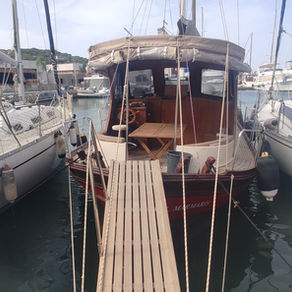Use of Foreign-Flagged Vessels in Turkish Waters: Legal Framework and Key Considerations for Compliance
- Jul 28, 2025
- 3 min read

1. Legal and Administrative Regulations
Turkish citizens may purchase foreign-flagged boats and operate them within Turkey, subject to compliance with specific legal procedures.
To legally maintain a foreign-flagged boat in Turkish waters, a Transitlog (Navigation Permit Document) must be obtained. This document officially records the vessel’s presence in Turkish territorial waters, movements between ports, port entry and exit procedures, and its navigation route.
The Transitlog is valid for one (1) year and must be renewed annually.
A Turkish citizen owning a foreign-flagged vessel may renew the Transitlog and keep the boat in Turkey for a maximum duration of five (5) years. Following this period, the vessel must be temporarily removed from the country, or additional permission must be obtained.
Foreign-flagged vessels are generally prohibited for commercial use and are permitted only for private leisure activities by the owner and first-degree relatives.
2. Taxation and Customs Regulations
Foreign-flagged boats may benefit from certain tax advantages in Turkey, including exemptions from Value Added Tax (VAT), reduced flag registration fees, and benefits related to foreign company ownership.
Such boats may berth in customs-controlled marinas within Turkish territorial waters and remain for durations as stipulated by the Transitlog. Customs declarations are mandatory for the vessel and all onboard equipment.
Changes to onboard equipment or maintenance and repair works are partially subject to customs regulations. While maintenance and repairs may be conducted in Turkey, customs notification and approval from the relevant Port Authority are required, particularly for lifting the vessel from the water or replacing parts.
3. Usage Restrictions and Operational Considerations
Chartering, rental, commercial tours, or any commercial activities conducted via foreign-flagged boats within Turkey are strictly prohibited. Use is limited solely to personal voyages by the owner and their first-degree relatives.
The Transitlog must explicitly specify the names (including Turkish Identification numbers) of authorised persons and the approved route. Individuals not listed in the document are not permitted to navigate the vessel.
Any change of port or route must be immediately reported and updated with the Port Authorities.
Dual flagging of vessels by Turkish citizens is prohibited; vessels must bear a single valid flag to avoid significant legal penalties.
Employing commercial or auxiliary crew is generally forbidden except for certain large yachts and is contingent on both the flag state and national regulations.
4. Maintenance, Repairs, and Port Procedures
Maintenance and repair activities for foreign-flagged vessels may only be performed at authorised ports. Operations involving taking the vessel out of the water require prior approval by the Port Authority.
All vessels with a length of twelve (12) meters or greater are required to undergo surveying, maintenance, and repairs exclusively at facilities licensed by the Port Authority under requisite reporting conditions.
Important Considerations
Navigating Turkish ports without a valid Transitlog is subject to substantial penalties.
Customs procedures, including legal applications and permits, are mandatory for maintenance work, equipment changes, and importation of parts.
Incomplete or inaccurate declarations related to route or crew in the Transitlog result in punitive measures.
The use of foreign-flagged vessels for commercial purposes is strictly forbidden and may incur severe sanctions upon detection.
Summary
To legally operate a foreign-flagged boat in Turkish waters, Turkish citizens must:
Renew the Transitlog annually,
Adhere to a maximum stay period of five (5) years,
Restrict usage to the owner and immediate family only.
Fully comply with customs, port authority regulations, and maintenance protocols,
Avoid any commercial use of the vessel.
For questions or uncertainties, consultation with relevant authorities is strongly recommended to ensure up-to-date compliance with current legislation.









Comments